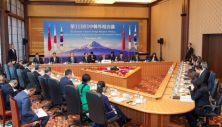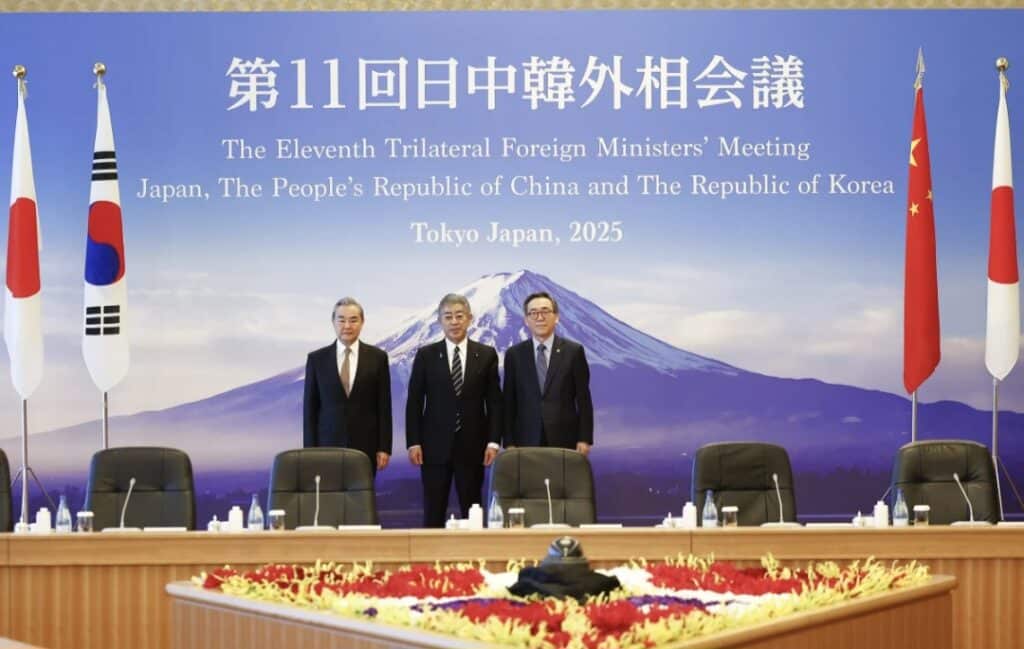From Eleventh Japan-China-ROK Trilateral Foreign Ministers’ Meeting Minister Iwaya, referring to the significant influence and responsibilities...
Vous n'êtes pas connecté
- English
- Français
- عربي
- Español
- Deutsch
- Português
- русский язык
- Català
- Italiano
- Nederlands, Vlaams
- Norsk
- فارسی
- বাংলা
- اردو
- Azərbaycan dili
- Bahasa Indonesia
- Հայերեն
- Ελληνικά
- Bosanski jezik
- українська мова
- Íslenska
- Türkmen, Түркмен
- Türkçe
- Shqip
- Eesti keel
- magyar
- Қазақ тілі
- Kalaallisut ; kalaallit oqaasii
- Lietuvių kalba
- Latviešu valoda
- македонски јазик
- Монгол
- Bahasa Melayu ; بهاس ملايو
- ဗမာစာ
- Slovenščina
- тоҷикӣ ; toğikī ; تاجیکی
- ไทย
- O'zbek ; Ўзбек ; أۇزبېك
- Tiếng Việt
- ភាសាខ្មែរ
- རྫོང་ཁ
- Soomaaliga ; af Soomaali
Rubriques :
 Maroc - EURASIAREVIEW.COM - A la une - 24/Mar 00:07
Maroc - EURASIAREVIEW.COM - A la une - 24/Mar 00:07
Is East Asia At A Turning Point? – OpEd
From Eleventh Japan-China-ROK Trilateral Foreign Ministers’ Meeting Minister Iwaya, referring to the significant influence and responsibilities for the peace and prosperity of the region and the international community shared by Japan, China and the ROK, stated that enhancing future-oriented exchanges and cooperation of the three countries holds great significance. --https://www.mofa.go.jp/press/release/pressite_000001_01107.html When Japanese Foreign Minister, Takashi Iwaya, in his welcoming remarks at the start of the trilateral summit meeting of Japan, China and South Korea on 21 March noted that “Given the increasingly severe international situation, I believe we may truly be at a turning point in history,” he was not simply expressing a personal opinion. He was also emphasising a position on current geopolitical dynamics which is reverberating and gaining traction throughout the western world and its allies as well as in the East Asia and Asia Pacific region. This possible turning point has come about with Donald Trump’s election and his “make America great again” policy which is not only upending decades old alliances born out of the cold war but is also reshaping the global political and economic order. The likely consequences of Trump’s still emerging but already quite well defined foreign policy and its implications for Asia and the Pacific may be discerned from what is taking place in Trump’s initiative and leading role to bring the Ukraine-Russian war to a settlement. Trump Foreign Policy and East Asia The first is that allies of the U.S. in Western Europe and Asia Pacific region will have to pay much more for the military and defence protection provided by America under Trump’s presidency. For now, the White House is drawing up demands for Germany, Japan and any other country hosting U.S. troops to pay the full price of American soldiers deployed on their soil - plus 50 percent or more - for the privilege of hosting them. In some cases, nations hosting American forces, according to administration officials, may be asked to pay five to six times as much as they do now under the “Cost Plus 50” formula. Whatever figure is finally arrived to ensure a “fair deal” according to Trump’s satisfaction, this will not come cheap for Japan and South Korea which have been tied to America’s militarized umbilical cord since the beginning of the cold war seventy years ago. Japan has over 54,000 U.S. military personnel stationed in the country whilst South Korea has over 28,500 active-duty soldiers, sailors, airmen, and marines stationed there. From 2016 through 2019, the U.S. Department of Defense spent $20.9 billion in Japan and $13.4 billion in South Korea to pay military salaries, construct facilities, and undertake maintenance. The governments of Japan and South Korea provided $12.6 billion and $5.8 billion to support the U.S. presence. In 2024 alone, the U.S. military budget allocated to the Indo-Pacific Command (USINDOPACOM) was $15.3 billion. Japanese policy makers - though not the public yet - are fully aware that in 2019, the Trump administration asked Tokyo to roughly quadruple the amount it contributed to the cost of maintaining U.S. troops in Japan. This demand is likely to be made again soon for payment - in one form or another - by the Japanese government for what Trump has repeatedly alleged to be past Japanese exploitation of American generosity in trade and defence, and “predatory and protectionist” economic policies. South Korea, although agreeing recently to increase its share of hosting U.S. forces by 8.5% in 2025, can expect more pressure to pay a much higher sum for the privilege of American protection. The second consequence is a possible Trump attempt to re-engage with North Korea’s leader, Kim Jong Un. Although unsuccessful during his first term in reaching any sort of agreement, Trump has said on several occasions after his inauguration in January that he will reach out to Kim again. His reasoning: "I have a great relationship with Kim Jong-un, and we'll see what happens". "But certainly, he's a nuclear power." Should Trump be successful this time round in his transactional and bilateral policy making strategy ostensibly to bring about the denuclearization of the Korean Peninsula and reduce the possibility of armed conflict involving the U.S.- this appears his strategy with his involvement in the Ukraine Russia war - both South Korea and Japan will face heightened security uncertainty and unpredictability whatever the outcome. A third possible consequence could see a sharp reduction in U.S. support for military partnerships seen as wasteful, ineffective and unaffordable to a cost cutting DOGE dominated fiscal agenda aimed at reducing U.S. annual government spending by U.S.$2 trillion. This Musk initiative requiring “temporary hardship” and for “everyone to take a haircut” to ensure long term prosperity for the U.S. will see security programmes in the Asia-Pacific region initiated under Biden’s watch - in particular the QUAD (U.S., Australia, Japan and India) initiative and AUKUS (Australia, United Kingdom and United States), trilateral security partnership - reduced in importance, and perhaps even abandoned. What this means for the US dominated security systems of Japan and South Korea will not be positive to the conservatives and cold war warriors from both sides of the Pacific. Trilateral Convergence on the Economic Front Perhaps the most important development relating to this “turning point” are the consequences on the economic front for the East Asia region. The past half century has seen the emergence of the economies of Japan, China and South Korea to become indispensable in the global economy due to their economic size, industrial capability, innovation, and the global demand for their products. Trump, with the backing of America’s political and business leaders, wants to regain what the US has lost to its Asian competitors with a tariff bazooka directed to burn every adversary in his mission to blaze a new page in the global economic marketplace. Most market observers expect China to bear the brunt of Trump’s tariff policies but South Korea and Japan will also be impacted though less than China. The trilateral meeting press release was reticent on the economic challenges that the three countries will face in the coming months. However, the readout line noting that future exchanges and cooperation of the three countries will hold “great significance” indicates that they are more than likely to be working together against protectionist policies and to collectively defend the open and free trade principles that they presently separately uphold. If that happens, it will help to defuse further their past conflicts and current geopolitical rivalry in the region. Their greater convergence on the economic front may also bring about an even more radical turning point than what Iwaya has drawn attention to.
Articles similaires
Foreign ministers of Japan, China, South Korea discuss Russia’s war in Ukraine
The foreign ministers of Japan, China, and South Korea -- Takeshi Iwaya, Wang Yi, and Cho Tae-Yul -- held a trilateral meeting in Tokyo to discuss...
Foreign ministers of Japan, China, South Korea discuss Russia’s war in Ukraine
The foreign ministers of Japan, China, and South Korea -- Takeshi Iwaya, Wang Yi, and Cho Tae-Yul -- held a trilateral meeting in Tokyo to discuss...
Japan, China, South Korea discuss security
The top diplomats from Japan, China, and South Korea met in Tokyo on Saturday to discuss East Asian security and economic issues. Japanese Foreign...
Japan, China, South Korea discuss security
The top diplomats from Japan, China, and South Korea met in Tokyo on Saturday to discuss East Asian security and economic issues. Japanese Foreign...
Japan, South Korea, and China Agree to Strengthen Trilateral Cooperation
Tokyo: Japan, South Korea, and China agreed today on the need to strengthen trilateral cooperation across various fields. This came during a...
Japan, South Korea, and China Agree to Strengthen Trilateral Cooperation
Tokyo: Japan, South Korea, and China agreed today on the need to strengthen trilateral cooperation across various fields. This came during a...
Pentagon Chief Hegseth Heads To Philippines Amid South China Sea Tensions
By Jason Gutierrez U.S. Defense Secretary Pete Hegseth is set to visit the Philippines this week, the first trip by a top official from the new...
South Korea’s Security Challenges In 2025: Balancing Military, Diplomacy, And Economy – OpEd
The Korean security environment in 2025 is shaped by the intricate interplay of regional threats, strategic alliances, and technological challenges....
Japan, China and South Korea discuss trilateral cooperation
TOKYO (AP) — Foreign ministers from Japan, China and South Korea sought trilateral cooperation on common ground in areas like aging, declining...
Les derniers communiqués
-
Adobe Brings Conversational AI to Trillions of PDFs with the New AI Assistant in Reader and Acrobat
Adobe - 21/02/2024
-
Laura Frigenti takes the Helm as Chief Executive Officer of the Global Partnership for Education
Global Partnership for Education - 05/12/2022

